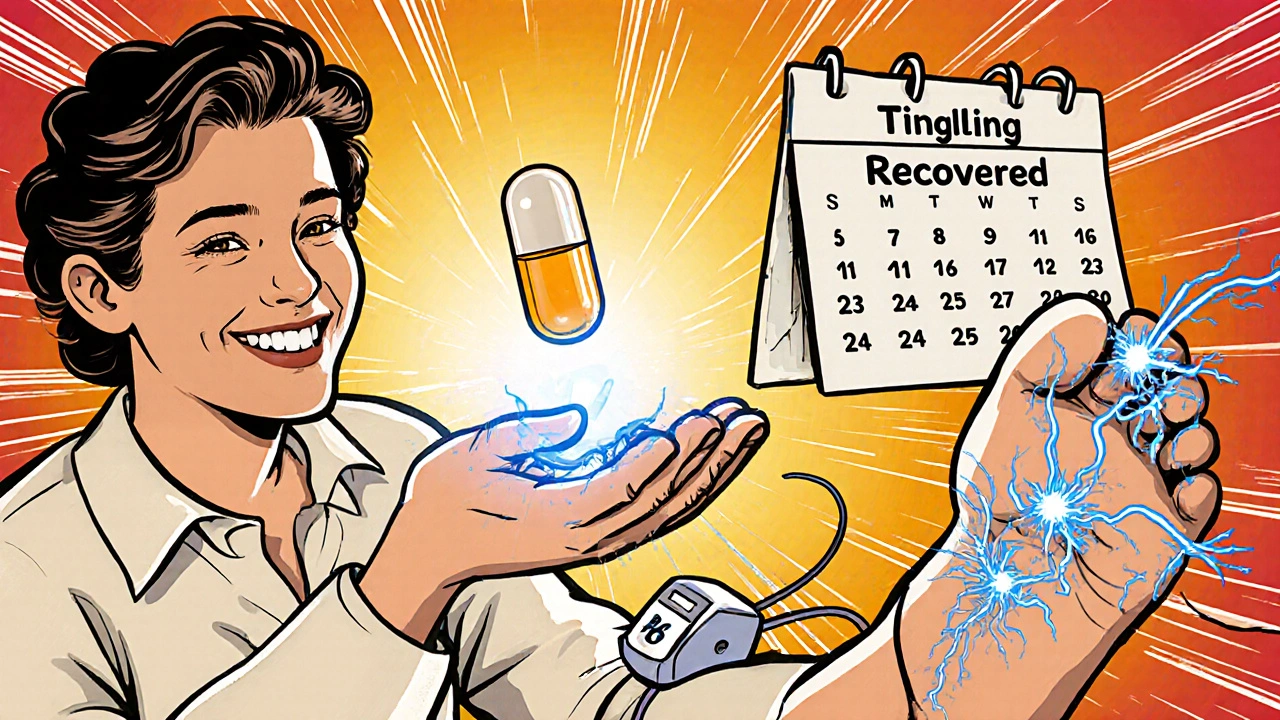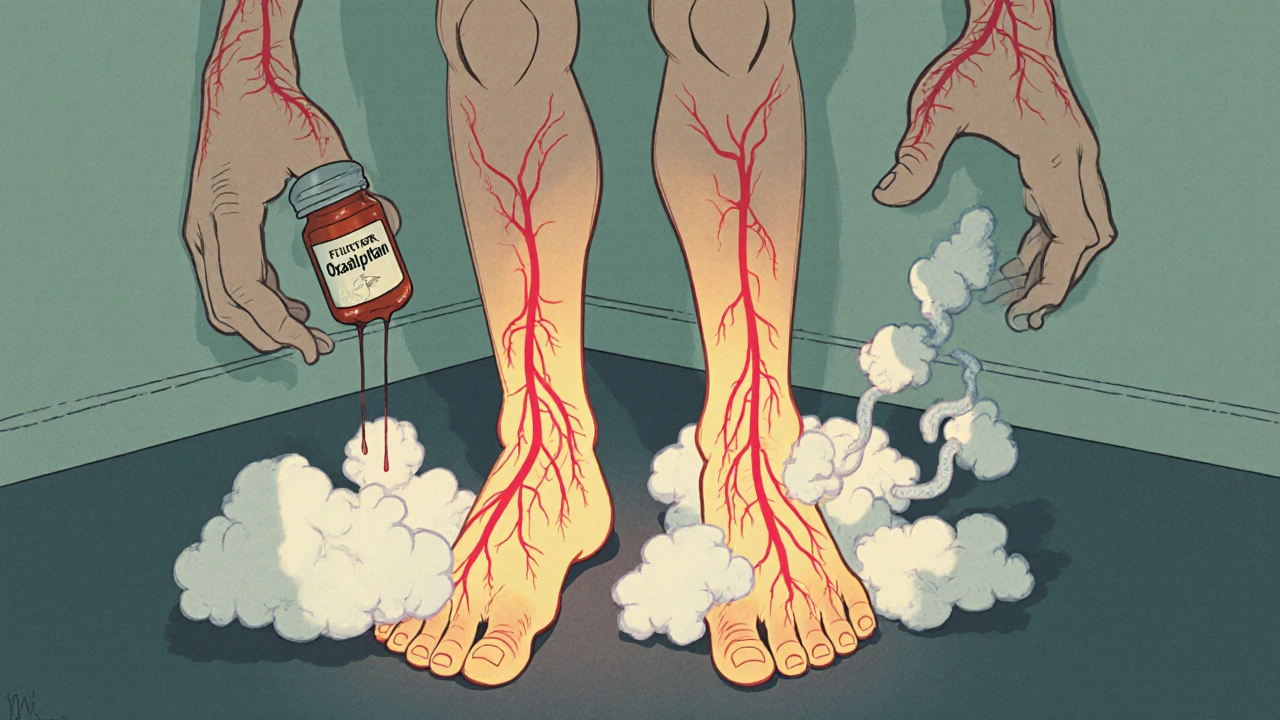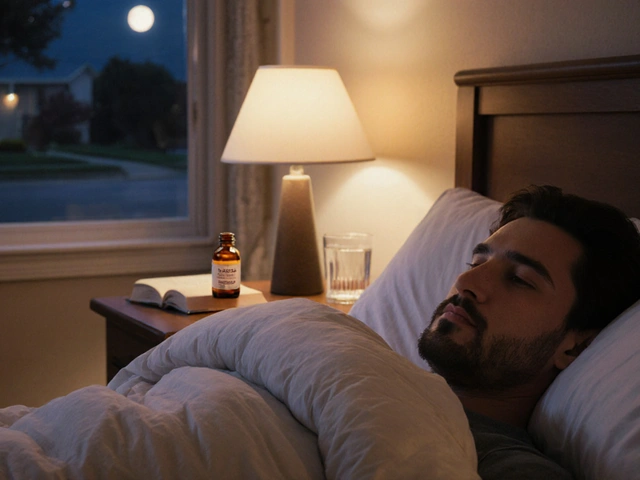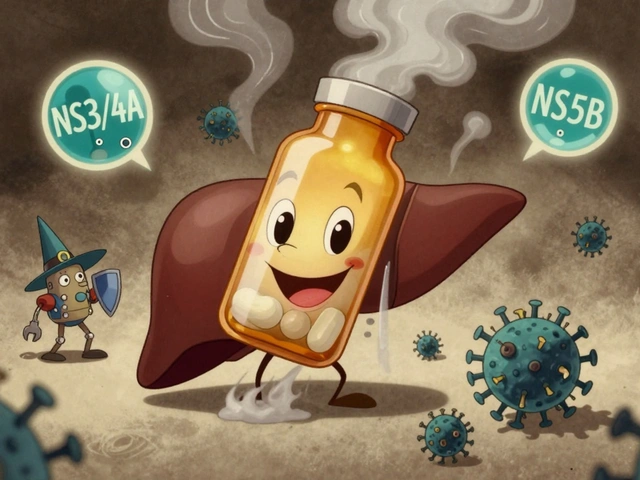Neuropathy Risk Assessment Tool
Medication Risk Assessment
It starts small. A quiet tingling in your toes. Maybe your fingers feel like they’re wrapped in cotton. You shrug it off-tingling and numbness from medications-maybe it’s just poor circulation, or stress, or you slept funny. But if you’re taking certain drugs, these sensations could be your body’s earliest warning sign of something more serious: drug-induced peripheral neuropathy.
What Exactly Is Drug-Induced Neuropathy?
Peripheral neuropathy means damage to the nerves outside your brain and spinal cord. These nerves control sensation, movement, and even automatic functions like digestion. When medications cause this damage, it’s called drug-induced peripheral neuropathy (DIPN). It doesn’t happen to everyone, but it’s far more common than most people realize.
Think of your nerves like electrical wires. Some drugs interfere with how those wires send signals. For example, chemotherapy drugs like oxaliplatin and paclitaxel disrupt the internal transport system inside nerve cells. Antibiotics like isoniazid drain your body’s vitamin B6, which nerves need to stay healthy. Even common medications like amiodarone for heart rhythm problems can slowly damage the protective coating around nerves.
The symptoms usually show up in a very specific pattern: your feet and hands first. That’s the classic "glove and stocking" distribution. You feel tingling or numbness starting at your toes or fingertips, then slowly creeping up your legs or arms. It’s not random. That pattern tells doctors it’s likely nerve damage from a drug, not something else.
Which Medications Are Most Likely to Cause This?
Not all drugs cause neuropathy-but some are well-known offenders. Here’s what the data shows:
- Chemotherapy drugs: Oxaliplatin causes tingling in 85-95% of patients during treatment. Paclitaxel affects 60-70%. These are the most common causes in cancer patients.
- Antibiotics: Isoniazid (used for tuberculosis) causes neuropathy in 10-20% of people at standard doses. Metronidazole (Flagyl) can trigger it after weeks or months of use.
- Antiretrovirals: Stavudine, an older HIV drug, leads to neuropathy in 25-35% of users.
- Heart medications: Amiodarone can damage nerves in 5-10% of long-term users.
- Statins: The link here is debated. Some studies suggest 1-2% of users may experience symptoms, but many experts believe this is overreported or coincidental.
The key difference between these drugs isn’t just how often they cause trouble-it’s how they do it. Oxaliplatin can make symptoms worse even after you stop taking it. Paclitaxel usually stops getting worse once you stop the drug. Isoniazid’s damage can often be reversed with vitamin B6 supplements. That’s why knowing the exact medication matters.
Why Early Symptoms Are Your Best Chance to Stop It
Here’s the most important thing: tingling and numbness from medications are often the first-and sometimes only-sign that nerves are being harmed. By the time you feel weakness, balance problems, or pain, damage may already be lasting.
Studies show that if you catch these mild symptoms early and act, you have a real shot at full recovery. One study found that 73% of people who stopped their medication at the first sign of tingling saw their symptoms go away or nearly disappear within six months. But if you wait until the numbness spreads to your knees or elbows, the chance of full recovery drops sharply.
Doctors call this the "window of opportunity." It’s the time between when symptoms start and when nerve damage becomes permanent. For some drugs, that window is just a few weeks. For others, it might be a couple of months. But once it closes, the damage often sticks around.
Dr. Norman Latov from Weill Cornell Medicine says it plainly: "Early recognition of mild sensory symptoms is critical because many drug-induced neuropathies are reversible if the offending agent is discontinued promptly."
![]()
What You Should Do If You Notice Tingling or Numbness
Don’t ignore it. Don’t assume it’s "normal." Don’t wait for your next appointment. Here’s what to do right away:
- Write it down. When did it start? Which fingers or toes? Does it come and go? Does it feel like pins and needles, or just dead weight? Write the details. You’ll forget them by your next visit.
- Call your doctor. Don’t wait. Say: "I’ve started feeling tingling in my feet since I began [medication name]." Don’t downplay it. This is not a minor complaint-it’s a medical signal.
- Ask about alternatives. Can the dose be lowered? Is there another drug with less nerve risk? For cancer patients, dose reduction often lets treatment continue while slowing nerve damage. Many patients stay on their meds with adjusted dosing and avoid permanent symptoms.
- Ask for a neurological check. Your doctor should test your reflexes, sensation, and balance. Simple tests like touching your toes with a cotton swab or checking vibration sense can catch early changes.
- Check for vitamin deficiencies. If you’re on isoniazid, ask about B6 supplements. For other drugs, B12 and folate levels matter too. Deficiencies can make nerve damage worse.
Some clinics now use tools like the Total Neuropathy Score or the EORTC QLQ-CIPN20 questionnaire to track symptoms over time. If your doctor doesn’t use one, ask why. You deserve to be monitored.
What Happens If You Don’t Act?
Ignoring early symptoms isn’t just risky-it’s common. A survey by the Foundation for Peripheral Neuropathy found that 52% of people with drug-induced neuropathy waited three months or longer before getting a diagnosis. By then, many had lost sensation in their feet, struggled to walk, or developed foot ulcers from not feeling injuries.
One patient on Reddit shared: "Started noticing numbness in fingers after 3 months of isoniazid. My doctor increased my B6 but didn’t stop the meds. Now 6 months later, still have tingling despite stopping."
That’s not rare. For people on chemotherapy, untreated neuropathy can force doctors to stop life-saving treatment. That’s a devastating trade-off: keep the drug and risk permanent nerve damage-or stop the drug and risk the cancer coming back.
That’s why early action isn’t just about comfort-it’s about survival.

New Tools Are Making Early Detection Easier
There’s good news: technology is catching up. In 2021, the FDA cleared the SudoScan device, which measures sweat response to detect early small nerve damage-before you even feel symptoms. It’s not in every clinic yet, but it’s being used in major cancer centers.
Doctors are also starting to use genetic tests to predict who’s more likely to develop neuropathy. Some people have gene variants that make their nerves extra sensitive to certain drugs. In the next five years, this kind of testing could become routine before starting chemotherapy.
And research is moving fast. A recent clinical trial found that acetyl-L-carnitine reduced the severity of paclitaxel-induced neuropathy by 40%. While not yet standard, it’s a sign that prevention is becoming a real focus.
How to Protect Yourself Going Forward
If you’re on a drug known to cause nerve damage, here’s how to stay ahead:
- Get a baseline exam. Before starting chemotherapy or long-term antibiotics, ask for a simple nerve check. That way, you’ll know what’s normal for you.
- Check your feet daily. If your feet are numb, you won’t feel cuts, blisters, or sores. Wash them, dry them well, and look for red spots or swelling. Wear shoes that fit. No barefoot walking.
- Remove tripping hazards. Loose rugs, cluttered floors, poor lighting-these become dangerous when your balance is off.
- Don’t assume it’s "just aging." Tingling isn’t normal at any age if it’s new and linked to a medication.
- Keep a symptom journal. Track changes week by week. Bring it to every appointment.
Medications save lives. But they can also harm. The difference between recovery and permanent damage often comes down to one thing: whether you speak up when the first tingling starts.
Can tingling from medication go away on its own?
Sometimes, yes-but only if the medication is stopped or adjusted early. If you keep taking the drug, symptoms often get worse, not better. For many drugs like paclitaxel or isoniazid, stopping the drug at the first sign of tingling gives you the best chance for full recovery. Waiting too long can make the damage permanent.
Is tingling always a sign of nerve damage?
Not always. Tingling can come from stress, poor posture, or a pinched nerve. But if it’s new, happens in your hands or feet, and started after beginning a new medication, it’s highly likely to be drug-related. Don’t assume it’s harmless. Get it checked.
Do all chemotherapy drugs cause neuropathy?
No. But many of the most effective ones do. Oxaliplatin, paclitaxel, cisplatin, and vincristine are among the most common culprits. Others, like doxorubicin or fluorouracil, rarely cause nerve damage. Your oncologist should tell you which drugs you’re getting and what side effects to watch for.
Can I take supplements to prevent neuropathy?
For isoniazid, vitamin B6 (pyridoxine) is proven to help prevent nerve damage. For other drugs, evidence is mixed. Acetyl-L-carnitine showed promise in trials for paclitaxel, but it’s not yet standard. Always talk to your doctor before taking supplements-some can interfere with your treatment.
Why do some doctors dismiss early tingling as "normal"?
Because it’s common. In cancer care, up to 70% of patients on certain drugs get tingling. Some doctors assume it’s unavoidable. But that’s outdated thinking. Studies show that with early intervention-dose changes, monitoring, or supplements-many patients avoid severe symptoms. You deserve better than "it’s normal."
Final Thought: Your Nerves Are Talking. Listen.
Medications are powerful. They can heal, extend life, even save you. But they’re not harmless. The first signs of nerve damage-tingling, numbness, a strange coldness in your fingers-are your body’s way of saying: "Something’s wrong here."
Don’t wait for pain. Don’t wait for weakness. Don’t wait for your doctor to ask. Speak up the moment you notice it. You’re not overreacting. You’re protecting your future ability to walk, to feel, to live fully.






Comments
Dana Dolan
November 19, 2025
Started tingling in my toes after my third chemo round. Thought it was just my socks. Turns out? Oxaliplatin. Called my oncologist same day. They lowered my dose. Now I’ve got feeling back in my feet. Don’t wait. Seriously.
river weiss
November 19, 2025
It is imperative to underscore the clinical significance of early detection in drug-induced peripheral neuropathy. The literature consistently demonstrates that discontinuation of the offending agent during the initial phase of sensory disturbance yields a statistically significant improvement in neurological recovery, as evidenced by multiple prospective cohort studies published in the Journal of Neuro-Oncology and the Journal of Clinical Neurophysiology.
Zac Gray
November 20, 2025
Oh wow, so if I feel like my feet are wrapped in wet socks after taking that antibiotic, I’m supposed to panic and call my doctor? I mean, I’ve had that feeling since college. It’s called ‘life.’ But hey, if your oncologist’s got a fancy questionnaire and a sweat scanner, sure, go ahead and turn your treatment into a full-time job. Meanwhile, I’ll be over here not turning a minor buzz into a medical emergency.
Steve and Charlie Maidment
November 20, 2025
Why do people always act like this is some new revelation? I’ve been telling my friends for years that statins give you numb hands. And yet, every time someone brings it up, doctors just shrug and say ‘it’s probably anxiety.’ Meanwhile, my uncle lost his balance and fell down three flights because no one took his ‘tingling’ seriously. You think this is about medicine? It’s about doctors being lazy and patients being too scared to push back.
Michael Petesch
November 22, 2025
Fascinating. The cultural context of symptom reporting varies significantly across populations. In East Asian medical traditions, for instance, peripheral sensations are often interpreted as qi imbalance rather than neurological damage. This raises the question: are we pathologizing normal sensory variation due to Western biomedical hegemony? Or is this truly a pharmacological epidemic? The data is compelling, but the framing deserves deeper anthropological scrutiny.
Chuck Coffer
November 23, 2025
So let me get this straight-you’re telling me that if I feel a little tingle after taking a drug I’ve been on for months, I’m supposed to believe it’s not just ‘my imagination’? Wow. Groundbreaking. Next you’ll tell me the sun rises in the east. I’ve been on metronidazole for two years. My toes are numb. My doctor said ‘it’s fine.’ Guess what? I’m still here. And still numb. So thanks for the PSA, but I’m not buying the hype.
Marjorie Antoniou
November 23, 2025
I’m a nurse, and I’ve seen too many patients ignore this until they can’t walk. One woman waited six months because she didn’t want to ‘bother’ her oncologist. She ended up with foot ulcers and had to stop chemo early. Don’t be that person. Write it down. Call. Ask for the test. Your body isn’t being dramatic-it’s screaming. Listen.
Andrew Baggley
November 25, 2025
This is the kind of post that gives hope. I had isoniazid-induced neuropathy after 4 months. Started with just my big toes. Called my doctor. Got B6, stayed on the med, and now I’m 18 months clean with zero symptoms. It’s not magic-it’s action. You’ve got power here. Use it.
Frank Dahlmeyer
November 26, 2025
Look, I’m not a doctor, but I’ve been through three rounds of chemo and watched three friends lose sensation in their feet because they waited. One of them had to use a cane at 42. The other two? They got lucky-stopped early, got supplements, got better. The difference wasn’t luck. It was listening. You think your doctor’s gonna catch it? Nah. They’re juggling 20 patients and 50 charts. You’re the only one who feels your own body. Don’t outsource your health. Be the advocate. Write it down. Speak up. Don’t wait for pain. Tingling is the alarm bell. Ring it.
Codie Wagers
November 27, 2025
The real tragedy here isn’t the neuropathy-it’s the collective delusion that medicine is benevolent. We’ve been conditioned to trust pills, to assume that if it’s prescribed, it’s safe. But the pharmaceutical industry doesn’t care about your toes. They care about your compliance, your refill rate, your loyalty to the brand. That ‘window of opportunity’? It’s not a medical window-it’s a corporate loophole. They profit from your silence. The tingling? It’s not your body talking. It’s your soul screaming against a system that treats you like a data point.
Paige Lund
November 28, 2025
So… I’m supposed to panic because my pinky tingles? Cool. I’ll just stop all my meds and live in a cave. Thanks for the life advice, Doctor.
Andy Feltus
November 28, 2025
It’s interesting how we’ve turned the body into a machine that must be monitored, calibrated, and optimized. But what if the tingling isn’t a bug? What if it’s a feature-a signal that we’ve lost touch with our own rhythm? Maybe the real problem isn’t the drug, but our addiction to control. We don’t want to feel the world anymore-we want to numb it, fix it, optimize it. And now, when our nerves whisper, we demand a diagnostic code instead of a pause. Maybe the cure isn’t stopping the drug… maybe it’s stopping the hurry.
Dion Hetemi
November 28, 2025
So you’re telling me that if I take a drug and my feet go numb, I should just stop it? What if it’s the only thing keeping me alive? You’re not thinking this through. This isn’t a blog post-it’s a life-or-death calculus. You don’t get to play ‘nerve roulette’ with cancer. And you sure as hell don’t get to guilt-trip people into choosing between survival and sensation. This post is dangerously naive.
Write a comment